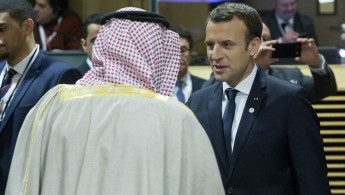French arms sales to Saudi Arabia, UAE, face legal challenge
Rights groups Droit Solidarite, a legal NGO, and Aser, which specialises in armament issues, demanded in March that export licenses to Saudi Arabia and the UAE be withdrawn and Prime Minister Edouard Philippe was given a two-month ultimatum.
With no response, the groups said they would present a legal challenge on Monday to the Conseil d'Etat, which advises the government on legislative matters and arbitrates on public policy issues.
"It will be up to (Council of State) to decide on the legality of the export licence authorisations issued by the prime minister," ASER et Droit Solidarite said in a statement.
The groups argue that France is violating national and international law by selling arms that are being used in the conflict in Yemen, where more than 10,000 people have died since a Saudi-led coalition, including the UAE, intervened in March 2015. The UN says it is the world's worst humanitarian crisis.
Saudi Arabia and the UAE are major buyers of French arms, and the country's top defence firms, such as Dassault and Thales have big contracts in the Gulf.
The world's third-biggest arms exporter, France's export licensing procedures have no parliamentary checks and are approved through a committee headed by the prime minister.
Last month, French President Emmanuel Macron faced calls from several international rights groups to to pressure Saudi Crown Prince Mohammad bin Salman over his country's deadly bombing campaign in Yemen, during his visit to Paris.
Some of France's European allies, including Germany, have curtailed links with the Saudi-led military coalition, though France, Britain and the United States have not followed suit, despite pressure from rights groups.





 Follow the Middle East's top stories in English at The New Arab on Google News
Follow the Middle East's top stories in English at The New Arab on Google News
![The UAE is widely suspected of arming the RSF militia [Getty]](/sites/default/files/styles/image_330x185/public/2024-11/GettyImages-472529908.jpg?h=69f2b9d0&itok=Yauw3YTG)
![Netanyahu furiously denounced the ICC [Getty]](/sites/default/files/styles/image_330x185/public/2024-11/GettyImages-2169352575.jpg?h=199d8c1f&itok=-vRiruf5)
![Both Hamas and the Palestinian Authority welcomed the ICC arrest warrants [Getty]](/sites/default/files/styles/image_330x185/public/2024-11/GettyImages-2178351173.jpg?h=199d8c1f&itok=TV858iVg)